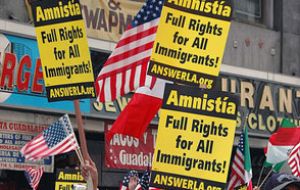MercoPress. South Atlantic News Agency
US libertarian think-tank supports legalizing undocumented workers
 According to a report from CATO, the positive impact could be equivalent to 180 billion USD
According to a report from CATO, the positive impact could be equivalent to 180 billion USD A new study from the libertarian CATO Institute concludes that legalizing the more than eight million undocumented workers in the United States would have significant economic benefits for the country, while simply enhancing border enforcement and applying restrictive immigration laws would actually hurt the US economically.
According to the study the overall positive impact for US households of legalizing these workers over ten years would be “1.27% of GDP or 180 billion USD.”
The new report, written by Professor Peter B. Dixon and Research Fellow Maureen T. Rimmer at the Centre of Policy Studies at Monash University in Australia, relies on an economic model used by the US Departments of Commerce, Agriculture, and Homeland Security, as well as International Trade Commission.
Weighing public spending and revenues, US employment rates in various occupations, and price levels for imports and exports, among other things, the authors conclude that “increased enforcement and reduced low-skilled immigration have a significant negative impact on the income of US households.” The minimal savings in public spending on immigrants now “would be more than offset by losses in economic output and job opportunities for more skilled American workers.” A policy that reduces low-skilled immigration to about a third less than projected levels, then, over ten years, “would reduce US household welfare by about 0.5%, or 80 billion USD.”
In contrast, “legalization of low-skilled immigrant workers would yield significant income gains for American workers and households,” the study found. Legalization would eliminate the costs of smuggling illegal immigrants, would allow immigrants to be more productive and openly participate in the economy, and it would “create more openings for Americans in higher skilled occupations.”
The report ends stating that the findings are consistent with previous studies that show economic benefits from the legalization of illegal workers.




Top Comments
Disclaimer & comment rules-

Read all commentsThis, along with calls to legalize and heavily tax a whole range of narcotics now deemed illegal, makes perfect economic sense. But what U.S. politician today has the courage to take on and become an advocate for either position?
Aug 16th, 2009 - 11:40 pm 0Commenting for this story is now closed.
If you have a Facebook account, become a fan and comment on our Facebook Page!